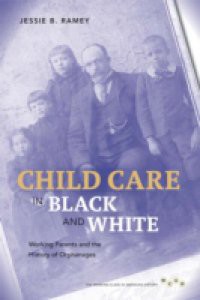This innovative study examines the development of institutional child care from 1878 to 1929, based on a comparison of two sister orphanages in Pittsburgh: the all-white United Presbyterian Orphan's Home and the all-black Home for Colored Children. Focusing on the agency of poor families who used these institutions in times of family crisis to meet their child care needs, Jessie B. Ramey explores the cooperation and conflict among working parents, children, orphanage managers, progressive reformers, staff members, and the broader community. Drawing on quantitative analysis of the records of more than 1,500 children living at the two orphanages, as well as census data, city logs, and contemporary social science surveys, this study investigates the intertwined hierarchies of gender, race, and class at the foundation of orphanage care. Raising new questions about the role of child care in constructing and perpetrating social inequality in the United States, Child Care in Black and White: Working Parents and the History of Orphanages provides insight into the lives of working-class families struggling to balance their wage labor and parenting responsibilities in a modernizing industrial economy.

